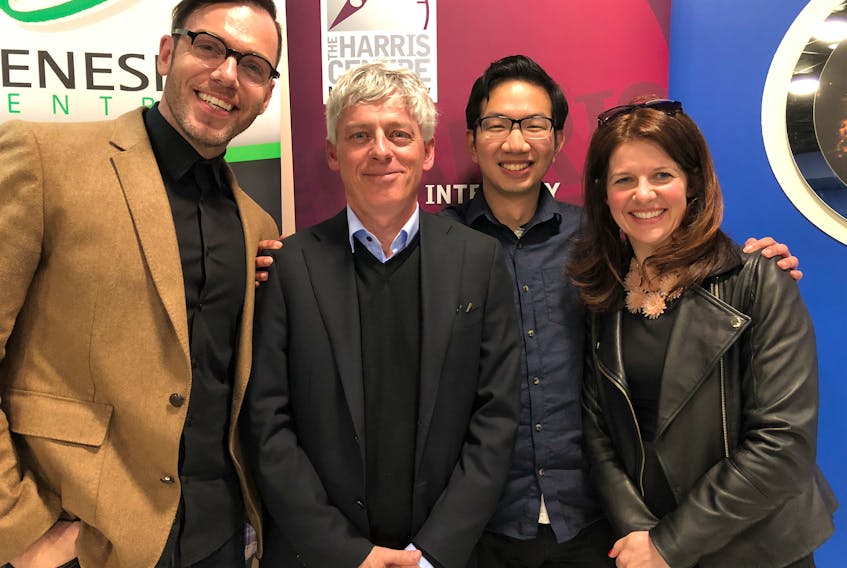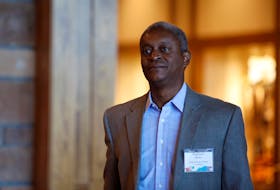Accepting and even celebrating failure is integral to a culture of innovation and entrepreneurship, but is the culture of Atlantic Canada ready to embrace failure as a step toward successful innovation?
That was the question posed to debaters at an Innovation Week event organized by the Harris Centre and the Genesis Centre Tuesday evening at the Johnson Geo Centre in St. John’s.
Genesis Centre president and CEO Michelle Simms said the event is one of many held during Innovation Week with an end goal of creating more start-ups in the innovation and technology sectors in the province.
Simms said the debate topic is an important one for people to think about in Newfoundland and Labrador.
“When there is a company failure and they do end up owing the government money or something like that, they end up on the cover of your paper sometimes, or in the media, and while they may have created 70 or 80 jobs for quite a long time and have been quite a success, oftentimes they don’t get perceived that way in the media or the public eye.
“One of the things we wanted to bring to the forefront is, oftentimes, in order to get success, you need to fail. In other jurisdictions across Canada — and Silicon Valley is a great example — oftentimes people fail multiple times before they are successful. We always hear of the serial entrepreneur — we want to make sure that people in Newfoundland and Labrador are going to be OK with that, and that they’re going to be embracing our entrepreneurs, not kicking them out of the province because they failed.”
The debaters were Kim Keating, VP of fabrication for the Cahill Group; Mark Kennedy, co-founder and CEO of Celtx; Joe Teo, co-founder and CEO of Hey Orca; and Don-E Coady, creative director and founding partner at DC Design House.
Debaters were given their stance before the debate, so their arguments during the debate should not be taken as personal opinions, but rather food for thought.
That was essentially the point of the event — to get people thinking about whether our culture is willing to embrace entrepreneurs during all stages of development, including when they fail.
“Entrepreneurs fail spectacularly all the time, and yet we still produce entrepreneurs, and those entrepreneurs still start new businesses,” said Kennedy, who argued that the culture of Atlantic Canada does embrace failure as a step toward successful innovation.
Kennedy noted only 35 per cent of new businesses that enter the marketplace are still around in five years’ time and that nationally in 2016, more small businesses failed than succeeded — 83,000 versus 78,000.
“That’s a spectacular history of failure right there.”
Despite failing, entrepreneurs still start new businesses, and so “accepting failure is integral to a culture of entrepreneurship,” Kennedy said.
Kennedy cited one of the biggest failures in the province’s history — cod — and said that what people learned from it is now contributing to great successes.
“In places like Fogo Island where they’ve taken the lowly cod, a 500-year-old product, and now by just small tweaks, and changes in the approach to the way they catch that, process it, market it, sell it — invented a new product that’s created much more value for the whole community. That’s true innovation when you just generate off of something that already exists. You don’t necessarily need to invent a new energy source. It just means changing the way that you do things. I think that’s already occurring.”
Teo argued that Atlantic Canada is not ready to embrace failure as a step toward innovation.
He pointed out that when travelling to other places he’s been able to avail of many high-tech payment and travel methods that are yet to take root in this province.
“We’re still using archaic systems because that’s what people are OK with, and I think complacency marks this province a lot and I think that’s something we need to break out of,” Teo said.
“We’re a very smart population here and as long as we realize that oil and gas and the public sector are not the only two that we have to choose from, that’s when we see real embracing of failures, real embracing of innovation. We’re not there yet, but I think we’re starting.”
Again, it should be noted that debaters did not necessarily agree with the points they were arguing — they were told which side they were on before the debate.
“There’s no black and white right answer,” said Rob Greenwood, debate moderator and director of the Harris Centre. “I think both sides will make people think, and above all else, that’s what we need.”
“We have had the benefit and enjoyment of the oil boom and the commodity boom in general, and of course oil prices dropped and that’s not a surprise — commodities go up and down. … The more we diversify and be less dependent on commodities the better. But we are also in a situation on planet Earth with new technologies, artificial intelligence, all changing the way every sector operates, so we need to figure out how we adapt and apply that.
“We are going through a demographic dramatic change in our province. We used to have the highest fertility rates in Canada, and now we have the lowest. We have an aging population. Like everywhere else in the world, we have rural-to-urban migration. There’s still going to need to be people living in rural areas with mining, and fishery, and tourism, and forestry, but there’s going to be fewer, and there needs to be much higher productivity, and very innovative.
“So, our traditional industries, our emerging industries, our very way of life, requires us to be innovative and entrepreneurial.”
In the end, the “pro” team won the debate by audience vote — perhaps an indication that people in this province are ready to embrace failure.
Twitter: juanitamercer_









